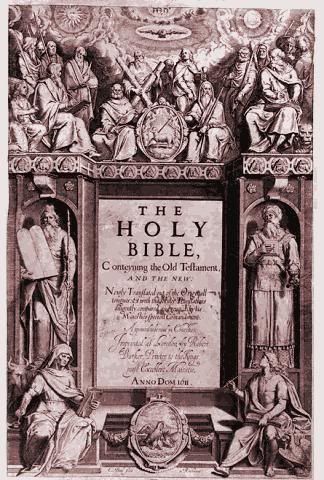
I'm in an Old Testament class here were someone asked the professor, Dr. Baruch Schwartz, which translation he recommended for those not using Hebrew. He recommended the JPS, a modern Jewish translation that has a similar translation philosophy to the NIV, but almost always gives much better renderings of the Hebrew text, and of course, slants the translation in a way that is more harmonious with Jewish belief. He also mentioned that, in the class, he would like to get as many different translations as possible. Another student wanted to clarify and said, “So, the JPS is a good translation?” to which the professor replied, “No, it's terrible. They're all terrible. You can't capture the richness of the Hebrew in any language except Hebrew. If you need a translation, just bring whatever is the easiest for you to understand, and we'll discuss the text in class.” It's like the old saying, “There is no error in translation. Translation itself is an error.”
But, this is just how we talk in the Academy. If everyone read Hebrew and Greek, that would be wonderful, and we wouldn't have to walk around with these rubbish translations. In fact, I'd recommend that any Christian learn the languages of the Bible even if you only have the least bit of time or inclination. Just don't stop half way and start using these interlinears...
However the study of Greek and Hebrew does not become a reality for most people. Some people don't have the time, or the aptitude, or the finances, or the motivation. Motivation is kinda a lame excuse, since we're talking the words of God here (what could be more important?), but the others may at times be valid.
In any case, there are more important things for understanding the text than the original languages. On of these things is a good understanding of the Ancient world. If you have to pick whether to learn Greek and Hebrew, or to read Josephus, Hammurabi, and Gilgamesh (a question facing most of us every day), go with Josephus and friends. I can highly recommend the recent
“Archaeological Study Bible” for help in this area. The text comes alive in context. Another important thing, perhaps the most important thing of all for understanding the bible is to look at each book as a whole. If you understand the flow of thought and internal logic in an entire book, the individual verses will almost always fall logically into place. Some of the larger prophetic books and the Psalms are more of collections than “books”, and require a different approach, but that's another matter.
“How to Read the Bible for All its Worth” is an excellent book to explain this idea in detail. They have their own discussion of English translations there as well.
Anyway, back to translation. Before getting on to discuss any of the individual translations, I just want to mention what some of the difficulties are with translation and various methodologies.
Literal translations are great if you know Biblical languages. They can give you a pretty clear idea of the words and syntax of the original, and are very handy for study when you can't lug around a dictionary. However, this raises the question of why you are studying a translation if you know the original languages. If you don't know Greek and Hebrew syntax or semantics, the important question comes up of what can actually be gained from seeing a translation that follows it. If you don't understand things like Greek cases, tenses, and moods, and how all those things fit together to create meaning, there is really no point at all to have literal translations of them. There is a German translation that I love called Elberfelder. It is extremely literal. It's almost like reading Greek in German words. The only problem is that it's not quite German. I don't know how Germans that haven't studied Greek get along with it. It's great for preaching because it gives you a lot of opportunities to explain Greek idioms, but for a normal person to read, I don't know. Of course, my grasp of German syntax isn't perfect either, so I may be missing something there.
Furthermore, in the Old Testament, I'm going to go ahead and say that it is absolutely impossible to make a literal translation of the Hebrew in many cases into any modern western language. The verb system and syntax of classical Hebrew, translated literally has no sense in English. Greek is usually somewhat intelligible when translated literally. Hebrew is not. Let's make a literal translation of the most famous passage in the Old Testament (and one of my favorites) for a little demonstration. The dashes indicate where a single word in Hebrew contains all the semantic information joined together in English.
“Hear Israel, Yhwh Gods-us Yhwh one.
And-you-loved (untranslatable word) Yhwh Gods-you, in-all heart-you and-in-all soul-you and-in-all strength-you.
And were the-words the-these which I commanding-you the-day over heart-you.
And-you-pierced-them to-sons-you and you-spoke in-them, in-to-sit-you in-house-you and-in-to-walk-you in-the-way and-in-to-lay-you and-in-to-rise-you.”
This doesn't make any sense at all. In fact, in this case, as in most cases, a literal translation of the verb form in Hebrew absolutely does not mean what the Hebrew means. You see a lot of past tense forms, but that's not what the Hebrew means at all. In Hebrew, you only understand a verb form by it's relationship to all the other verbs. Strange but true. As for what I have written, I don't even understand it myself. It's senseless. In any case, for several of the words, I still had a few semantic options for how to translate because no English word means exactly the same thing as a Hebrew word. There is still, even in this extremely literal translation, interpretation. This translation is not helpful in any way, literal though it may be.
Just to rectify the situation, let's translate this into what I believe to be the meaning in English. I say that because there is necessarily more interpretation being done with this kind of a translation. This is still quite literal, but it makes sense in English. I use a lot of vocabulary that isn't in the transitional translation because it provides a closer semantic correspondence between the English and Hebrew, I believe.
“Listen Israel, Yahweh is our God, only Yahweh. Love Yahweh, your God, with your whole mind, with your whole being, and with your whole ability. These things that I'm charging you with today must be on your mind. Impress them on your kids, and talk about them... when you sit in your house, when you walk on the road, when you lay down, and when you get up.”
This is very different, you see. I can't guarantee you that this is exactly what Moses meant (or “D”, or whoever), but I will promise that it's infinitely closer than the meaningless gibberish in the previous translation.
Why can't I guarantee it? Because to translate it at all, even in this relatively literal format, I have to interpret some words. The number “one” in Hebrew can also mean “only.” It can mean “alone” or “each.” Some people think it can mean “first,” (though I have my doubts about this). The word “soul”... we don't have a word that means exactly this in English. It can mean, as I have translated “being.” It could also mean “life-force,” “person,” “inner being,” “spirit,” “identity,” “self,” etc... This words can mean any of these things (though it never exactly corresponds), but in any given case, it only means one thing. You have to figure it out based on the context. Another word in this verse, the one I first translated as “pierced,” and again as “impress,” only appears with this form once in the Bible. It's impossible to know exactly what the meaning is, aside from that it is in some way related to “sharpen” on one hand, and "tooth" on the other, but it is difficult to say exactly how. The point is clear: the text is supposed to become part of who your children are. It is instrumental in their formation. How exactly to say this in English while remaining semantically faithful to the original is difficult.
No matter how literal a translation is, the translator must make a subjective judgment about the meaning of the text. That's one of the reasons the King James translators said “a variety of translations is useful for discerning the meaning of the scriptures.” and included in the margins a healthy complement of translation notes, which have unfortunately been removed from most print editions (Hendrickson Publishers has a nice facsimile of the
1611 edition that retains them, and a good many other helpful features present in the original, not to mention the delightful archaic spellings, soe saithe vnto thee ye olde translation).
Now, there are good ways and bad ways to make these decisions about the meaning when you translate. Ideally, you leave same ambiguity when the original is ambiguous (however, ambiguity that gives options of meaning impossible in the original text are a very bad thing), and you make the meaning clear when the meaning is clear. It is the unfortunate reality that occasionally a literal translation will obscure a meaning that is very clear in the original language simply by being literal. The other way to make good decisions in translation is by study of the whole text. You understand the argument of the whole book, and make your decisions based on the message of the book. In this way a translator nearly becomes a commentator. There is also the important role that the translator plays in choosing the proper base text, but I don't want to get into that at the moment, as it is at least as complex as the act of translation itself.
It's not at all bad that there is interpretation in a translation. We have to interpret the text to live it out. I only say all this to demonstrate that you can't take any particular translation too seriously in terms of being “authoritative.” They are all interpretations. They all have strengths and weaknesses as interpretations, and those are not necessarily tied to being “literal” or not. There are good and bad literal translations, just as there are good and bad idiomatic translations. There are several translations that I like very much, and most of them fall somewhere in the middle of literal and idiomatic.










